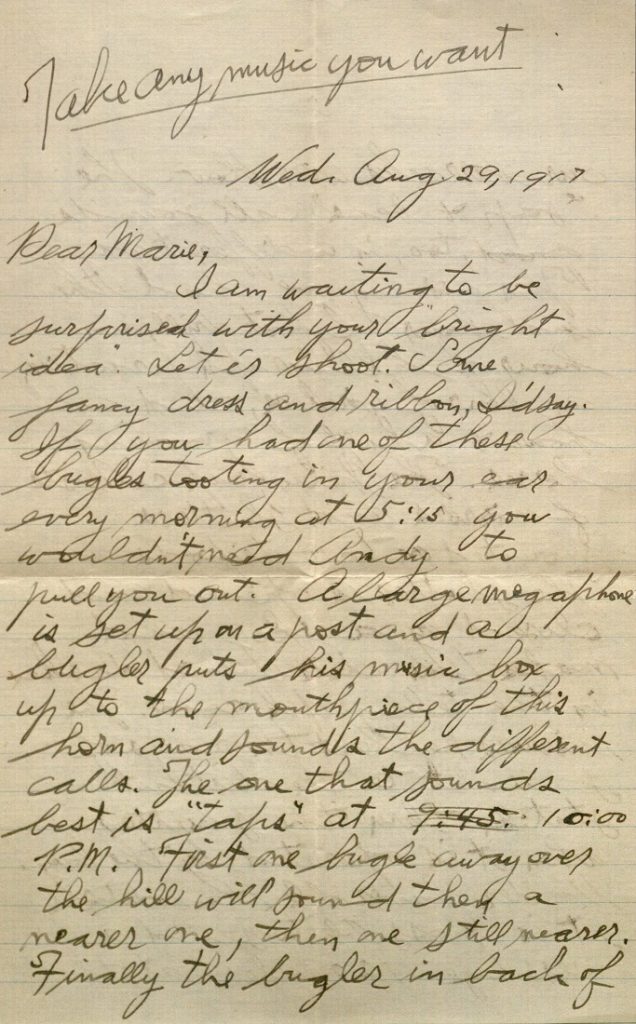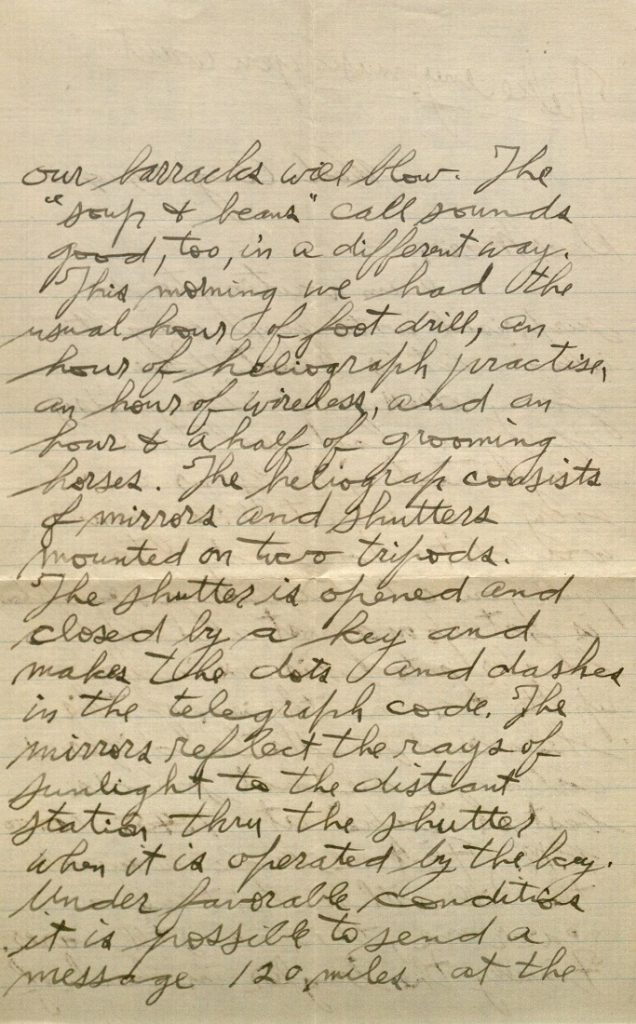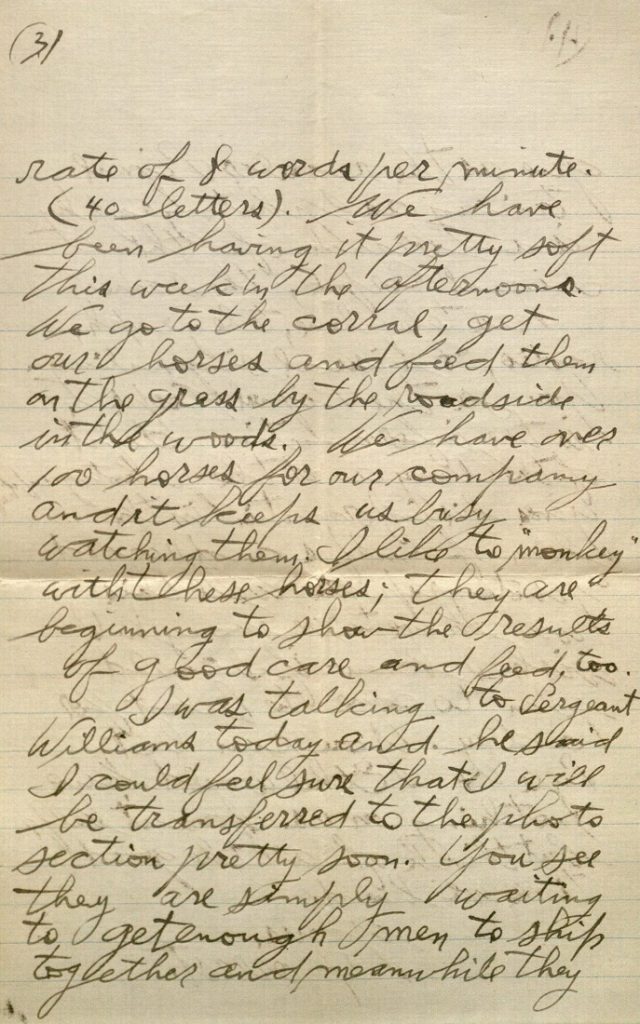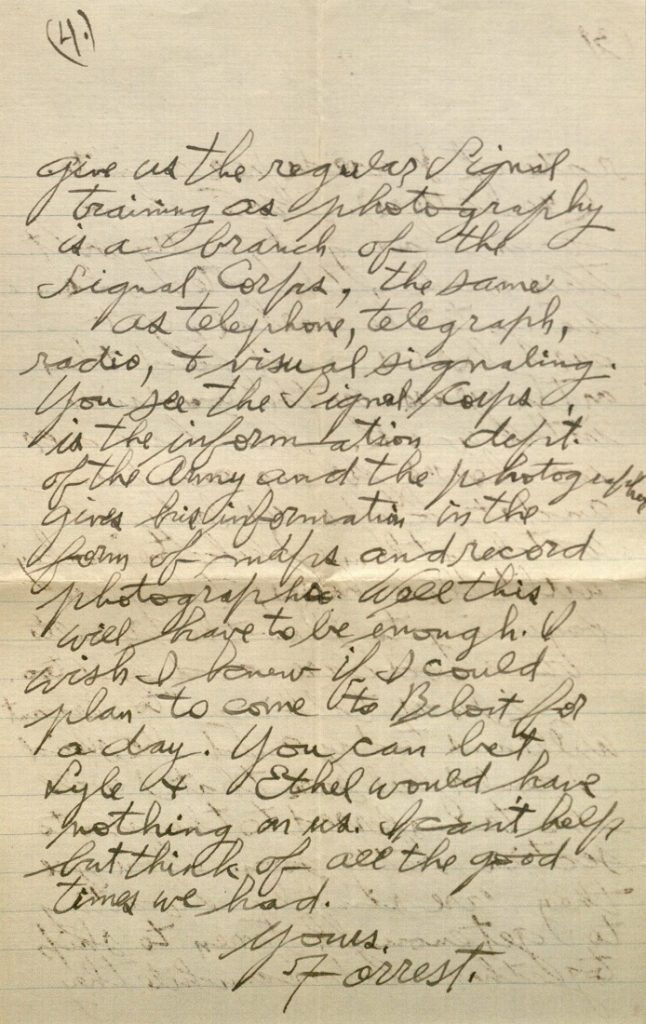World War I Letters of Forrest W. Bassett: September 4-10, 1917
September 5th, 2017In honor of the centennial of World War I, we’re going to follow the experiences of one American soldier: nineteen-year-old Forrest W. Bassett, whose letters are held in Spencer’s Kansas Collection. Each Monday we’ll post a new entry, which will feature selected letters from Forrest to thirteen-year-old Ava Marie Shaw from that following week, one hundred years after he wrote them.
Forrest W. Bassett was born in Beloit, Wisconsin, on December 21, 1897 to Daniel F. and Ida V. Bassett. On July 20, 1917 he was sworn into military service at Jefferson Barracks near St. Louis, Missouri. Soon after, he was transferred to Fort Leavenworth, Kansas, for training as a radio operator in Company A of the U. S. Signal Corps’ 6th Field Battalion.
Ava Marie Shaw was born in Chicago, Illinois, on October 12, 1903 to Robert and Esther Shaw. Both of Marie’s parents – and her three older siblings – were born in Wisconsin. By 1910 the family was living in Woodstock, Illinois, northwest of Chicago. By 1917 they were in Beloit.
Frequently mentioned in the letters are Forrest’s older half-sister Blanche Treadway (born 1883), who had married Arthur Poquette in 1904, and Marie’s older sister Ethel (born 1896).
Forrest spends considerable time in the first of this week’s letters questioning the progression of his relationship with Marie and seeking her opinion. “Do you think we have gone too far,” he asks her. “That is one reason why I thought you should go with other boys, although I hate to think of you with anyone else…Marie tell me exactly what you think. Would you prefer that we just be very good friends?” Highlights from the second letter include Forrest’s new “mighty fine military wrist watch” (“it is sure some watch – 15 jewel with Swiss movement, and luminous dial and hand”) and Forrest’s close call with a mule (“I was brushing the hind legs of 1 of the new mules, he suddenly plunged around sideways at me, kicking with both feet”).
Click images to enlarge.
Did you get the postcard in my last letter?
Wed. Sept. 5, 1917
Dear Marie,
I have just been reading your last letter from Rockford. You sure spoke the truth when you said that we would never tire of eachother, no matter how much we were together, if we really loved eachother. Every time we have been together has strengthened my love for you, but I know that I never realized how much I cared until leaving you. I think about what D.B. said in the clipping was right, as a rule. But do you think we have gone too far. That is one reason why I thought you should go with other boys, although I hate to think of you with anyone else. Marie, I want you to do the things that are for your own good. You are very young, but you seemed to understand me so well that I couldn’t help but treat you like an older girl. Marie tell me exactly what you think. Would you prefer that we just be very good friends? Surely your mother knows what is best. I hate to think of giving you up even for just a few years, but love you too much to think of anything but that which will make you the happiest in the long run. What is it, Marie, that you don’t like to write to me? I am telling you everything; can’t you do the same and trust that I will understand? I was not surprised at the change in your regard for L. I have exactly the same experience when I saw her “at home.”
Won’t you write everything you think, and not wait until we see eachother? Your letters are exactly as I would have them. They do make me mighty lonesome for you but the things that make me lonesome also make me happy in a different way so please don’t write any different because of that reason. Marie let’s be as close to eachother as we can even although there are a good many miles between us. I am wondering what the surprise is that you and your mother are planning. I am losing lots of valuable sleep for fear I won’t be pleased. We don’t get up until 5:45 A.M. now, but we drill later in the afternoon. This afternoon we cleared a lot of rock out of the A-6 corral so the horses wouldn’t break their legs galloping around. Believe me it was some hot piece of work. I had to scrub my pants, shirt and four handkerchiefs after supper. We have three bathtubs in the basement for washing clothes. We soak our clothes, then lay them on a board across the tub and scrub them with yellow soap and a big brush. It’s a gay life. Can you picture it? We groom our horses every morning now. It has been my luck to draw one horse and a packmule every day for the last 4 or 5 days. I sure do wish that I could go bike riding and hiking with you this Fall. Didn’t we have some fine times up the river, and “everything ‘n everything.”
Marie, is there anything I can do that would make you the least bit happier? In your next letter please answer the things I ask.
Yours,
Forrest.
I am sending the card you asked me to.
This picture of the erection of a field wireless station is a very true representation of how it is done.
Sept. 9, 1917
Dear Marie,
If any girls’ letters could fill a man with enthusiasm and ambition, your’s surely do. You are every bit the girl that I have always believed you were and I know I need never have any case to doubt you. I know that this war can’t last very much longer and I feel that I will surely come back to you no matter how things go. Somehow, I can’t see the dark side of anything anymore. Everything seems to come my way. I wonder if you expect very much of a change in me when I come back. If you do you will surely be disappointed because I’ll be the same boy that said “goodbye” that Tuesday night. Marie are you sure you love me enough to give yourself to me for all time? I should like to know just what you think you know of me. That is something you can tell me when we see eachother again. I am anxiously waiting for the fudges. Blanche sent me some more but they go pretty fast. Sorry you had hard luck the first time. I just got a mighty fine military wrist watch from Art Goss. It is sure some watch – 15 jewel with Swiss movement, and luminous dial and hands. Almost half of the men and all the officers have wrist watches; no fobs are allowed to be worn. I guess we get paid tomorrow so I will get the Vest Pocket camera. Corporal Westrum and I went out taking pictures this afternoon. If they are good I will send some. Westrum is acting as Co. clerk at present and he says they expect to hear from Washington what is to be done with photographers very soon now. I don’t want to leave here very soon as this is sure a great place. Yesterday the Vth section moved into a separate room of our own. We have got a fine sergeant. He cusses us up and down during the foot drill period but I guess we deserve it. Friday 5 other men & I were detailed to round up 11 new mules and lead them to the A-6th stables. They were loose in a little half acre corral and believe me we had our troubles. They were a wild bunch and it took the six of us over an hour to get the ropes on them. I’m glad there are no mules in the wagon section. Yesterday morning I had my first very close call. When we groom the horses we take them from the corral and tie them a yard apart to a chain stretched taut between posts about four feet high. I was brushing the hind legs of 1 of the new mules, he suddenly plunged around sideways at me, kicking with both feet. I stepped ahead just in time to miss the hoofs but was pinned in between the picket chain & the mule. The chain caught me between the ribs and the hip bone and the force of the blow doubled me up for a minute. Friday afternoon another fellow from the Vth section went to the hospital – more horse thumbprints. Take it from our truly, this lad is going to watch his step.
I know just exactly how you felt about that sweater coat. It is yours until I come back and Ethel had no right to urge you to loan it to her after you refused it. I do not care if she wears it – but I want you to do just as you want to. I do think your folks were wrong in making you give the sweater to Ethel.
Well I suppose you will be back to school when this reaches you. If I were you I would drop that piano playing at school. Do your own work the best you can and no more.
Yours,
Forrest.
Meredith Huff
Public Services
Emma Piazza
Public Services Student Assistant












